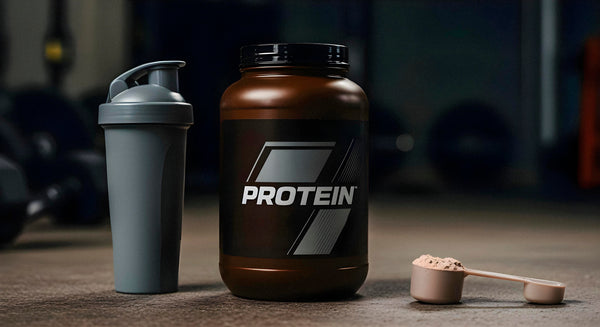Protein, the building block of life is essential for nearly every function in your body—from building and repairing tissues to producing enzymes and hormones to supporting immune health. The recommended dietary allowance (RDA) for protein is 0.8 grams per kilogram of body weight per day for adults 18 years and older. But when your body doesn’t get enough of it, the signs can be subtle at first and gradually become more pronounced over time.
So how can you tell if you're dealing with a protein deficiency? Maybe you’ve noticed that you’re feeling more fatigued than usual, or perhaps your skin and hair aren’t as vibrant as they used to be. These could be a few signs that your body isn’t getting the protein it needs.
In this blog, we’ll walk you through the key symptoms of protein deficiency, explain what happens when your body is running low on this vital nutrient, and offer practical tips for tackling these symptoms in a way that’s simple and effective.
What Is Protein Deficiency?
Protein deficiency occurs when your body doesn't get enough protein to meet its needs. It can happen due to poor diet, specific health conditions, or even certain lifestyle choices. While many people associate protein deficiency with malnutrition, even mild protein deficiency can lead to a variety of physical and mental symptoms. That’s why it’s important to recognize the signs of protein deficiency before they become more severe. A few signs of protein deficiency include:
1. Unexplained Fatigue
One of the first and most common symptoms of low protein in the body is a constant feeling of tiredness or fatigue. Protein plays a key role in creating the enzymes that break down food into energy. When you don’t get enough protein, your body’s energy production slows down, leaving you feeling sluggish. This is particularly noticeable during or after physical activity when your muscles need protein to repair and regenerate. So if you’re feeling unusually drained or lethargic, it could be your body signaling that it’s lacking protein.
2. Hair, Skin, and Nail Problems
Protein is crucial for maintaining healthy hair, skin, and nails. These tissues are primarily made up of keratin, a protein that helps them remain strong and resilient. When you have low protein in your body, you may start to notice that your hair is thinning, your nails are brittle, or your skin becomes dry and flaky. The body tends to prioritize vital functions, so less critical functions like healthy hair and nails can suffer when protein intake is insufficient.
3. Swelling and Water Retention
A lack of protein can also lead to edema or swelling, particularly in the hands, feet, or legs. This happens because protein helps maintain fluid balance in your body. When protein levels are low, your body can struggle to regulate fluid, leading to water retention and swelling. This is a telltale sign that your body is missing something essential in your diet—especially if you are experiencing puffiness in the abdomen or legs without any obvious cause.
4. Weak Immune System
Proteins are essential for building and maintaining a strong immune system. Without enough protein, your body has fewer antibodies to fight off infections. This means you might catch colds or infections more often, or your body might take longer to recover. If you’ve noticed that you’re getting sick more often than usual, it might be time to check in with your protein intake.
5. Muscle Weakness and Loss of Muscle Mass
When you’re low on protein, your body may begin to break down muscle tissue to compensate for the deficiency. This can lead to muscle weakness, a loss of muscle mass, and general fatigue during physical activities. Muscle repair and growth are highly dependent on protein, so without it, muscles struggle to recover after exercise or even basic movements. If you’re noticing that your muscles feel weaker or you have trouble building strength, a protein deficiency could be the culprit.
6. Increased Hunger or Cravings
Another surprising symptom of protein deficiency is increased hunger. When your body doesn’t get enough protein, it sends signals to your brain to keep eating. Protein helps you feel fuller for longer by influencing hormones that regulate appetite. Without enough protein, you might find yourself reaching for snacks more frequently or feeling like you can’t satisfy your hunger, even after a full meal. If this sounds familiar, your body might be asking for more protein to help keep those hunger cravings in check.
7. Mood Swings and Mental Fog
Your brain relies on certain amino acids found in proteins to produce neurotransmitters that regulate mood, cognition, and focus. When protein intake is insufficient, you might start feeling more irritable, anxious, or even depressed. This is because your brain is not receiving the nutrients it needs to function optimally. Protein deficiency can also lead to brain fog, where you struggle to concentrate or remember things. So, if you're noticing shifts in your mood or struggling with mental clarity, it could be a sign that your body is lacking protein.
8. Slow Healing
Finally, one of the key symptoms of low protein in the body is delayed healing. Whether you’re recovering from a minor cut or a more significant injury, protein is essential for repairing damaged tissues. Without enough protein, your body struggles to regenerate cells and tissues quickly, which can delay recovery. If you find that even small wounds take longer to heal than they should, it might be time to evaluate your protein intake.
How to Boost Protein Levels
If you're noticing these protein deficiency symptoms, don’t worry—there are plenty of ways to get your protein levels back on track. Here are 3 easy tips:
-
Incorporate a variety of protein-rich foods: From plant-based sources like lentils, beans, and quinoa to animal-based options like lean meats, eggs, and dairy, including more high-quality protein in your diet is a simple way to support your body’s needs.
-
Consider supplements: If you're struggling to get enough protein through food alone, high-quality plant-based protein supplements can be an excellent option. Look for products that use clean, sustainable ingredients to ensure you're getting the best possible source of protein for your body.
-
Balance your meals: Ensure each meal includes a good source of protein to maintain a steady supply throughout the day. This can help regulate energy, prevent cravings, and support muscle maintenance.
Understanding what happens when your body is low in protein is key to maintaining your overall health and well-being. The signs of protein deficiency are often subtle at first, but addressing them early can help prevent more serious health issues down the line. Whether it’s adding more protein-rich foods to your meals, considering high-quality supplements, or simply being mindful of how your body feels, taking action can help you stay energized, focused, and strong. Don’t let protein loss symptoms sneak up on you—give your body the protein it deserves to thrive.
FAQs
-
What is protein deficiency?
Protein deficiency occurs when your body doesn’t get enough protein to meet its needs, leading to issues like muscle loss, fatigue, and weakened immunity. It can result from poor diet, medical conditions, or insufficient protein intake over time.
-
What are the signs of protein deficiency?
Common signs include fatigue, hair thinning, brittle nails, muscle weakness, frequent infections, swelling, and increased hunger. Symptoms can start subtly but worsen if protein intake remains low.
-
What happens if your body is low in protein?
A lack of protein can lead to muscle breakdown, delayed healing, mood swings, poor concentration, and reduced energy levels. Over time, it may weaken immunity and impact overall health.
-
How much protein do I need daily?
The recommended daily intake is 0.8 grams per kilogram of body weight for adults, but active individuals or those aiming for muscle growth may need more. Balanced meals with protein-rich foods can help meet daily needs.

























